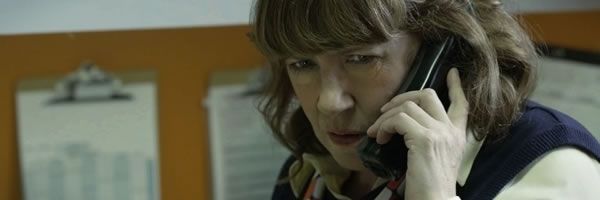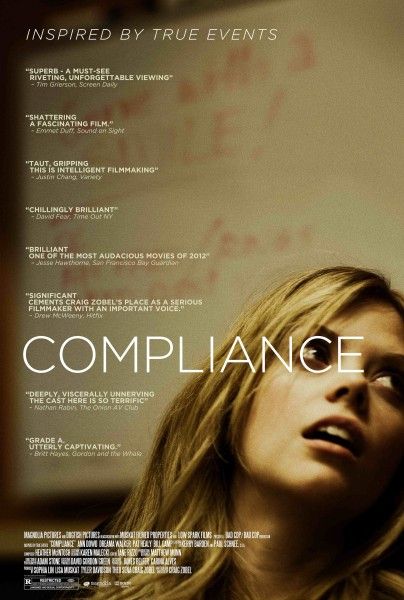Based on true events, Compliance is a startling and stark film about a prank caller (Pat Healy) who convinces a fast food restaurant manager (Ann Dowd) to interrogate an innocent young employee (Dreama Walker), in a way that changes all of their lives, forever. Recognized for her work in the small indie drama, Ann Dowd was honored with a Virtuosos Award at the Santa Barbara International Film Festival (SBIFF). Collider was there to cover and attend the event, and we’ve compiled the highlights of what the actress had to say, both on the press line and during the Q&A.
While there, Ann Dowd talked about how gratifying the response to the film has been, along with her work in it, why she felt she could bring something to this character, what it was like to work with co-star Pat Healy entirely over the phone, how protective she felt of Dreama Walker, and the horrifying experience of her first professional acting job. Check out what she had to say after the jump.
What makes the SBIFF so special to you?
ANN DOWD: Well, I’ve always heard how wonderful a festival it is and how appreciative fans are of the films that show and how supportive they are, and it’s a beautiful city. I have friends who live here. I just think it’s the kind of place you’re drawn to. And people are very gracious. It’s a wonderful feeling.
How much does it mean to you that people really did get the chance to see a small film like this and really recognized the work that was in it?
DOWD: That’s a great question. You’re right, it is a small film and it showed in very few theaters for not a long period of time. For people to watch the movie is just a wonderful thing. I think it’s an important movie. There’s a reason to see it. It’s not an easy watch, but I think it’s a very valuable one. So, that’s very gratifying.
Your performance in this film was certainly worthy of a nomination, and you even self-financed a campaign to make sure people got to see it. Ultimately, does the fact that the audiences who saw this film really responded to it and your performance in the way you would have hoped, even though you didn’t get any nominations?
DOWD: Yes, and that’s a great point because you can get really caught up in this, as I did. I was hopeful. It was an exciting thing. I’d never done that before, and I had wonderful people supporting me and showing me how it’s done. So, there was disappointment on that morning. Possibly it’s because I’ve been doing it for awhile and I’m not in my 20's, but I could put things in perspective and get back to that place where I was so grateful that it got the attention that it got, that I had the chance to play the role, in the first place, and that people are seeing it. That’s just fantastic! So, I was able to get back to that place, pretty quickly, and just realize how fortunate I am and how great these kinds of things are.
What went through your mind when you first heard about this true event from 2004?
DOWD: Well, I didn’t know about it until I got the part and the director gave us a link to the story and to the Milgrim experiments. When I read the script, I knew it could be true because of the way the writer/director wrote it. It was so well written that I thought, “This is a human being, for sure, who can be played in an honest way.”
When you’re making a film like this, that’s based on a true story that’s so unbelievably disturbing, does it help or hurt you, as an actress, to remind yourself that it actually happened, or does that not come into play?
DOWD: Well, the work for the actor is always the same. We’re looking for a human being. We’re looking for believable human behavior. So, whether she lives in life or your imagination, what you hope for is to portray it as truthfully as possible. The thing about this role, when I read it, was that, on a gut level, I understood it. It’s not an IQ issue. She’s not a stupid person. She’s just a person who lost her self-esteem, a very long time ago. Because of that, she gave up her compass and abandoned her sense of self and didn’t realize she had the power to say, “I’m not doing that.” It happens to a lot of people. I think she’s not well-equipped in this job. She can’t handle the young people. They intimidate her. She wants to be like them. That’s a red flag. She’s years beyond them, and yet has not had the basic things in life that we all want, like love, respect and someone who says, “You know what? You’re fine the way you are.” She has no experience with that.
What was the process of doing those scenes with the man on the phone, Pat Healy? Was he actually on the phone with you?
DOWD: First of all, Pat Healy is the nicest man in the world. I want to say that loudly, to anyone that’s concerned. He couldn’t be nicer. A great decision that the director made, early on, was to film the restaurant scenes and, in the basement of where we shot, he filmed Pat Healy on the phone, talking to me on the phone. So, it was a real-life conversation. That’s a brilliant choice because there was no pretending to be on the phone. I was simply hearing this person and trying to respond, but never having it go to my head, which is lethal for an actor, because it was all happening, right at that moment. I think that really made a huge difference in the film, and that was thanks to Craig Zobel, who directed and wrote the film. That made all the difference in the world.
Did you and the cast members ever find yourself talking about this and the psychology of this whole event, when you weren’t shooting?
DOWD: Oh, no. We never talked about any of that. I think it’s rare, on the set, for actors to actually talk about the film itself while your downtime is happening. The work speaks for itself. You know you’re going to get out there and do the scenes. Cash is a great thing, of which we had none of, so I’m not saying that’s the way to go, but the wonderful thing about independent films is that no one is running off to their trailers because there are no trailers, and you’re lucky to be sitting on the empty camera box. Otherwise, you’re standing. It’s like doing a school play, in the best sense of that. There’s a huge comradery. Dreama Walker, who’s the wonderful actress playing the young woman, is a doll. I loved her, instantly. We talked about our lives. Dreama was moving to start her life in Los Angeles. That’s what we talked about. We talked about my children. And we were thick as thieves, very quickly. Actors have that gift because that’s how we do things. Intimacy has to happen really quickly, so that we can get the job done.
As a mother yourself, did you feel maternal towards Dreama Walker?
DOWD: I did, very much so. To be honest, I think that one of the reasons the red flag does not go up more quickly with this character is that she’s not a mother. Once you have children, a sense of protection of young people is a part of your life. You think, “Wait a minute, who is this man and what is he asking me to do?” Sandra does not have that reference.
In this film, you’re not playing anyone’s mother or sister, but just a character onto herself. Was that exciting for you?
DOWD: That was Heaven sent. It was not in reference to anyone else, except the demons that live in her life.
Was this a role you instantly wanted to do, when you read the script? Did you have to fight for this role?
DOWD: Oh, there was no fighting. That was the extraordinary part. I read it and went, “Well, this has been cast and there will be a star playing it. Why am I going in?” But, that happens. You go in, in case the star doesn’t take the role. It’s a form of purgatory. But, I read it and I thought, “This is fantastic!” So, I went in to audition and Craig Zobel and I worked on it. That’s a great sign in an audition, when you actually get down to the work, instead of having them say, “Thank you so much for coming in,” and you say, “Thank you! All the best!” This was right down to the work. We tried the scenes in a number of ways. We spoke very honestly about it. And for the first time in my life, as I was leaving, I said to the director, “If you’re interested in me, I want you to know I’m interested in you,” and I’ve never said that.
And then, we talked about dates. I was doing a play and it looked like the dates weren’t going to work out. I said, “You know, you just have to get me to the theater by 7 o’clock, and then we’re all good.” But, you can’t guarantee that with an independent picture when you’re on a wing and a prayer. So, I thought I’d lost that part. And then, after the first act of this particular play that I was doing, which was very tiresome and exhausting, I was laying down, flat on my back in the dressing room, and the phone rang. I never answer the phone during a performance, but I looked over and it was my manager, so I thought, “Okay, I’ll take this.” And she said, “You got Compliance.” I was speechless. I was deeply happy and grateful. I think it’s a very wonderful film. More importantly, it will stay with you, and it might get you to ask a question or two. It could possibly change the course of things.
What was the first professional acting job you ever had?
DOWD: My first job was a play in Chicago that was god awful. I was so happy, but the lead was psychotic, which became really apparent in the second week of rehearsal, and it was just downhill from there. And I repressed mostly everything about it. Thank you so much for asking.


